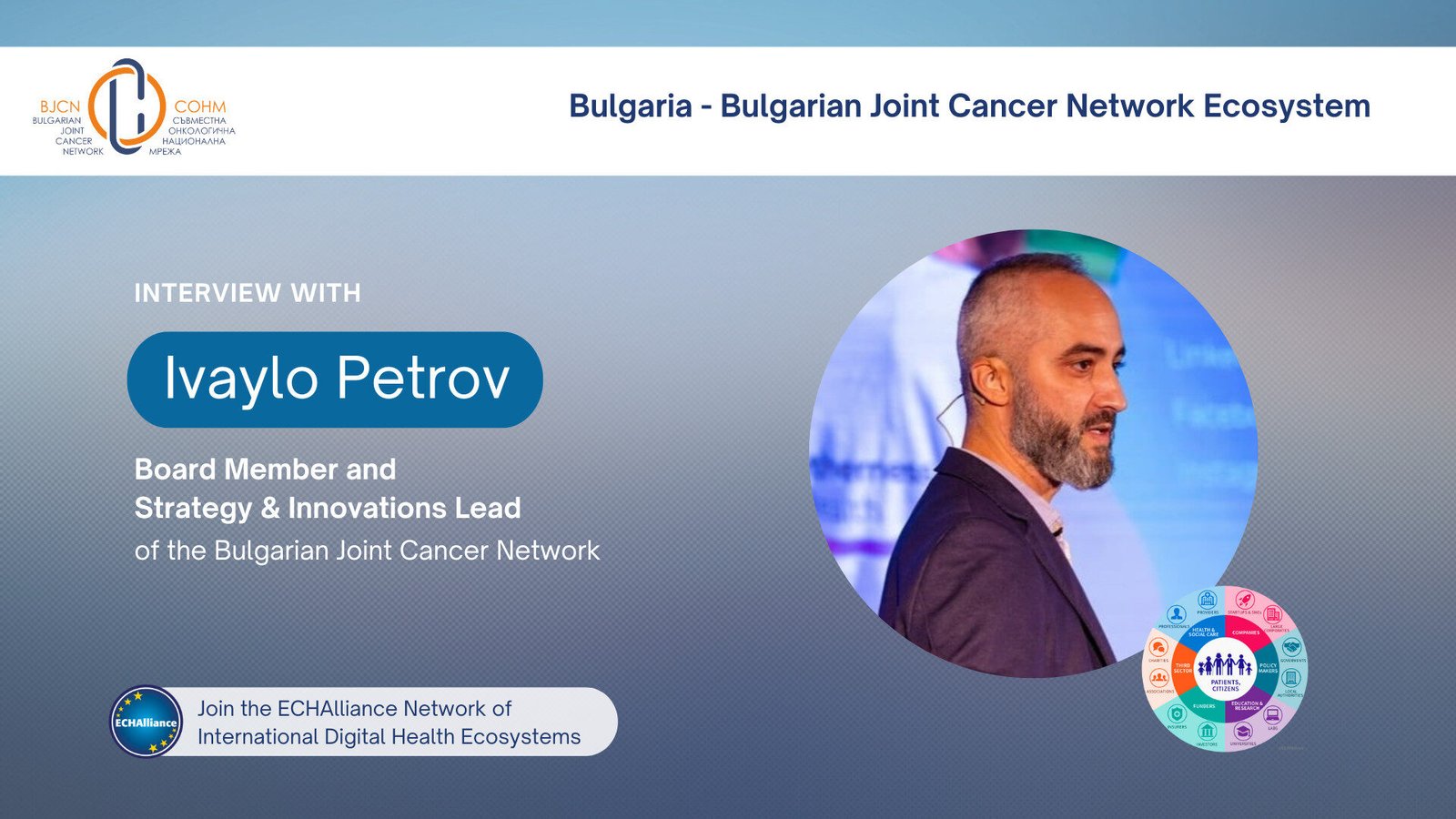We are very excited to welcome our second ecosystem from Bulgaria to our network: the Bulgarian Joint Cancer Network Ecosystem. To find out more about their work, read this interview with Ivaylo Petrov,Board Member and Strategy & Innovations Lead at the Bulgarian Joint Cancer Network.
Who are the key stakeholders?
BJCN functions as a national catalyst, connecting stakeholders within the Penta-helix model of collaboration and through shared goals, collaborative projects, and a commitment to evidence-based, digitally-enabled, and patient-centered cancer care. BJCN brings together a diverse group of national and international stakeholders committed to transforming cancer care in Bulgaria.
1. Clinical and Scientific Societies: Leading Bulgarian oncology experts across medical, surgical, radiation, hematologic, and supportive care disciplines. Medical and other universities and research institutions contributing to clinical knowledge and innovation
2. Patients and Civil Society: Patient advocacy groups and cancer survivors participating in co-creation, education, and evaluation. NGOs engaged in health equity, public awareness, and psychosocial support.
3. Digital Health and Industry Partners: Health-tech startups and AI innovators (e.g., Shemha Health, Kelvin Health, BGO Software, etc.) and Digital Health and Innovation Cluster – Bulgaria.
4. Policy and Government Institutions: Ministry of Health, Ministry of Education and Science, and Ministry of Innovation and Growth: strategic partners in digital health and cancer policy reform.Parliament committees and national agencies collaborating on legislation and governance for cancer care.
5. European and International Partners: OECI, IARC, ECO, All.Can, ESO, SPCC, and consortia such as 4P-CAN, CraNE, ECHoS, and EUnetCCC, with whom BJCN actively collaborates.
What are the main objectives of your ecosystem?
BJCN’s objectives position it as a central, politically connected ecosystem partner, facilitating interdisciplinary collaboration, innovation, and EU-aligned progress across the full spectrum of cancer care in Bulgaria.
Our key objectives are:
1. Create a national, open cancer-focused ecosystem: Structure a cross-disciplinary, non-governmental cluster comprising medical and non-medical societies and experts across oncology, enabling multidisciplinary collaboration at scale.
2. Foster synergy between knowledge actors: Bridge the “triangle of social knowledge”, universities, industry, and government, to enhance mutual benefits, amplify interactions, and generate positive external effects from the cluster.
3. Co-develop system innovation in oncology care: Lead and coordinate innovation efforts across prevention, screening, diagnosis, treatment, psychosocial support, quality of life, and digital health, leveraging cluster thinking to drive sustainable solutions.
4. Support and optimize expert functional integration: Harmonize and elevate the expert contributions of individual medical societies (both fundamental and clinical oncology) into unified, multidisciplinary frameworks.
5. Enable project-based research partnerships: Facilitate access to funding for fundamental, clinical, and practical oncology projects in collaboration with national and international partners.
6. Promote EU collaboration and policy alignment: Strengthen Bulgaria’s integration into EU-level cancer initiatives, such as EBCP, Cancer Mission Hubs (ECHoS), OECI, and Horizon Europe projects, driving shared innovation and harmonized policy frameworks.
Who is missing from your ecosystem in terms of stakeholders?
We believe that inclusion is key to scaling innovation, ensuring equitable access, and driving sustainable, system-wide impact in cancer care. That is why BJCN would benefit from stronger engagement with payers and data governance experts.
Why do you want to join the ECHAlliance Network of Ecosystems?
We aim to connect Bulgaria’s cancer and digital health ecosystem with a global community of innovators. As the Bulgarian Joint Cancer Network (BJCN), we are driving systemic transformation in oncology through continuous medical education, translational research, AI-powered solutions, digital tools, and cross-sector collaboration. Joining this global community will support the scaling of impactful initiatives while fostering international partnerships, knowledge exchange, and policy alignment. This collaboration will strengthen our role as a regional leader in health innovation and advance equitable, evidence-based cancer care.
Which ecosystems are you looking to collaborate with?
We look for collaboration with ecosystems driving innovation to address inequities across the cancer care continuum and health system reform — especially those in Europe, MENA, and Africa advancing continuous medical education, early detection, deep health-tech transformation, personalized care, and policy alignment.

